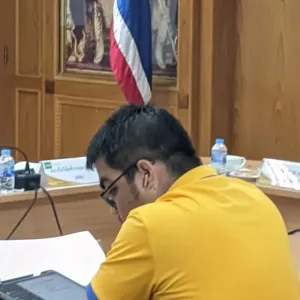Thailand Moves Forward on Low-Emission Rice: IRRI and Ministry Advance Thai Rice Project with GCF Support
On 29 May 2025, the International Rice Research Institute (IRRI) Thailand held a follow-up meeting with representatives from Thailand’s Rice Department under the Ministry of Agriculture and Cooperatives on the next phase of the country’s work plan that was jointly elaborated previously in February 2025. Led by Mr. Sommai Lertna, Acting Rice Production Technology Specialist, and Dr. Orathai Jaituy, Director

Thailand Moves Forward on Low-Emission Rice: IRRI and Ministry Advance Thai Rice Project with GCF Support
On 29 May 2025, the International Rice Research Institute (IRRI) Thailand held a follow-up meeting with representatives from Thailand’s Rice Department under the Ministry of Agriculture and Cooperatives on the next phase of the country’s work plan that was jointly elaborated previously in February 2025. Led by Mr. Sommai Lertna, Acting Rice Production Technology Specialist, and Dr. Orathai Jaituy, Director of the Foreign Relations and Special Projects Group at the Bureau of Rice Policy and Strategy, the meeting was conjoined by GIZ Thailand (Deutsche Gesellschaft für International Zusammenarbeit GmbH). The reunion marked the continuation of joint efforts among the partners toward transforming Thailand’s rice production system.
Two years since the signing of the joint work plan, IRRI and the Rice Department have engaged in sustained collaboration to advance this nationally significant initiative. Funded by the Green Climate Fund (GCF), the project Thai Rice: Strengthening Climate-Smart Rice Farming (Thai Rice GCF) is designed to transform the country’s rice sector through circular economy solutions and climate-smart practices. Globally, rice production contributes greenhouse gas (GHG) emissions on par with the aviation sector, making the need for sustainable solutions in rice farming both urgent and impactful. The project aims to reduce methane emissions through irrigation and straw management while enhancing climate resilience and financial sustainability for Thai rice farmers and service providers. It includes promoting technologies and practices such as rice straw recycling to create value-added products and new market opportunities—offering alternatives to traditional practices like open-field burning.
The current discussions have focused on defining specific priorities and operational steps for each participating stakeholder. IRRI is leading several key components of the project, including:
Direct Seeded Rice (DSR) systems, which involve mechanization through large-scale rice planters; Drone technology for water level tracking and Monitoring,…

